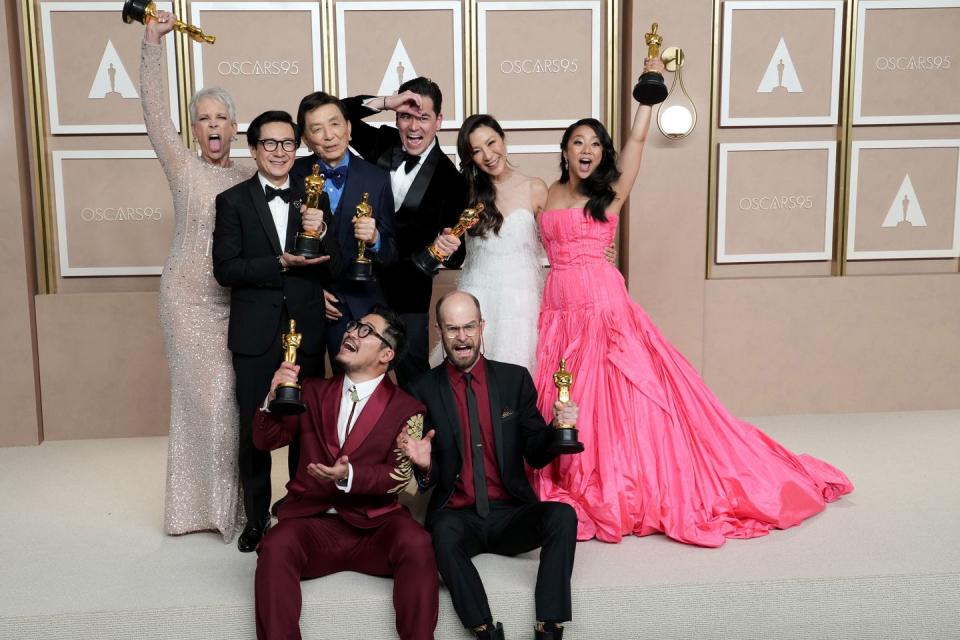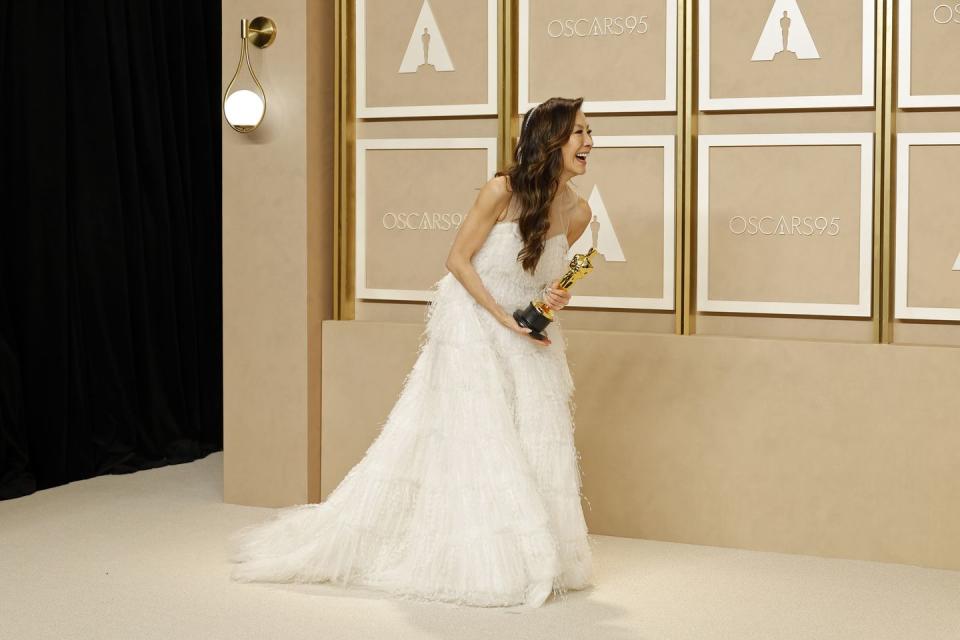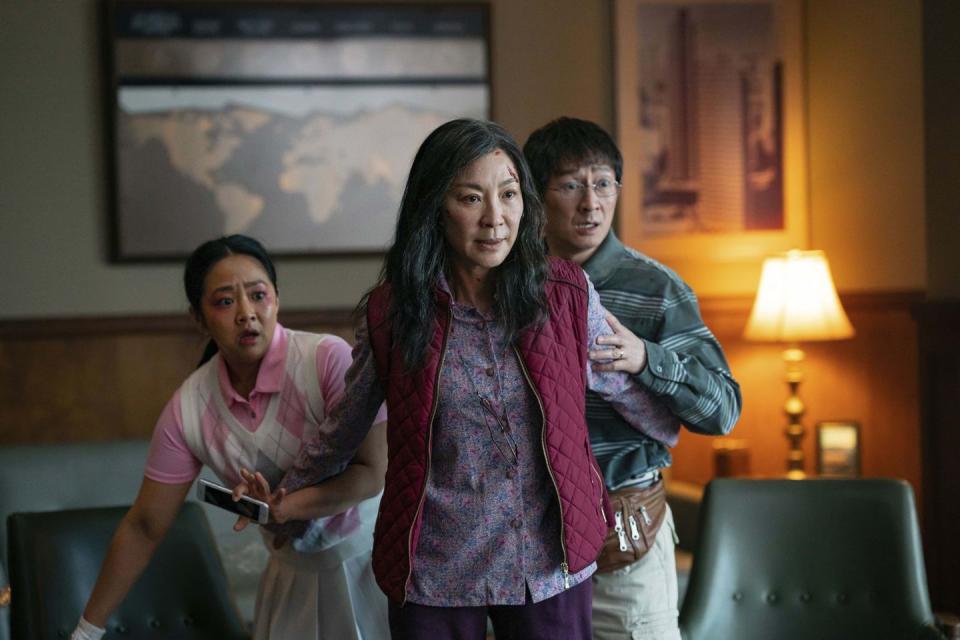The Oscars success of 'Everything Everywhere All At Once' is the ultimate validation of Asian narratives

It’s an image that's been ubiquitous in the media this week – everywhere, all at once, if you will: the beloved Malaysian movie star Michelle Yeoh making Oscars history as the first ever Asian winner of the Leading Actress award. Radiant and regal, the 60-year-old Yeoh held her golden Oscars statuette aloft with an expression of composure and victory. "For all the little boys and girls who look like me watching tonight, this is a beacon of hope and possibilities," she said in her winning speech. "This is proof that dreams… do come true. And ladies, don't let anyone tell you you are ever past your prime."
With its madcap pacing, surreal imagery (hot dog fingers! Talking rocks! Butt plugs!) and sci-fi warping of the Chinese American immigrant narrative, Everything Everywhere All At Once was not your typical Oscar contender. Yet the existential multiverse comedy dominated at the 2023 awards, sweeping seven wins across the board including Best Picture, Best Director and Best Original Screenplay.

The film’s Oscars success is a feel-good validation of Asian stories that don’t just think outside of the box, but playfully disrupt our notions of what that box could be. It is the first science-fiction film to win Best Picture in the Academy’s 95-year history, and its multiple wins feel especially timely due to the film’s unapologetic celebration of Asian identity in the midst of three years of anti-Asian hate incited by the pandemic.
EEAAO has cemented first-time award victories for actors Michelle Yeoh, Ke Huy Quan and Jamie Lee Curtis (although Curtis’ gong, which many believe should have gone to Stephanie Hsu, has not been without controversy). Yeoh and Quan’s wins have been widely embraced as a triumph for Asian representation and the satisfying payoff of a comeback narrative: Quan was a child star in the '80s, appearing in The Goonies and Indiana Jones and the Temple of Doom.
Yet the line between representation and tokenism can be a blurry and slippery one; Yeoh is only the second woman of colour to win the top acting award after Halle Berry made history as the only Black woman to win it back in 2002. Official Academy Award wording describes Yeoh as "the first person who identifies as Asian to win the Award". In 1936, Merle Oberon was the first woman of Asian descent to be nominated for Leading Actress, but she hid her South Asian identity to avoid discrimination in the white-dominated Golden Age of Hollywood.
A 2020 report by the University of Southern California analysed 1,300 popular films between the years 2007 and 2019, discovering that there was little to no meaningful increase in representation – despite Asian Americans being the fastest-growing demographic in the US. Only 3.4 per cent of films had an Asian American lead or co-lead; that's only 44 movies. Of those 44 movies, 14 were led by Dwayne 'The Rock' Johnson. The report also found that 39 per cent of films had no Asian and Pacific Island characters at all. In total, less than 6 per cent of all speaking roles went to API actors.

Quan is the first Asian winner of the Best Supporting Actor award. Both Quan and Yeoh are industry veterans, who have spoken about feeling marginalised and shut out of the industry, shunted into kung fu fighting roles which flattened and sidelined their versatility. What EEAAO's domination at the 2023 Oscars signifies is a promising (and hopefully ongoing, rather than faddish) cultural shift toward mainstream Hollywood embracing Asian stories and Asian creatives. This comes hot off the heels of the Korean film Parasite winning Best Picture at the Oscars in 2020 and Youn Yuh-jung’s Best Supporting Actress accolade in 2021 for the Korean-American family drama, Minari.
Yeoh's character, Evelyn, is more than just a hardworking, model minority tiger mother; in fact, it's the pressure of maintaining this stereotype and keeping her laundromat business afloat that triggers her intergalactic existential crises. Although she initially comes across as harried and humourless – the same could be said of many a traditional immigrant mother figure on film – within minutes, our expectations of Evelyn are unsettled. Weird hallucinations demonstrate her resistance to the Kafkaesque bureaucracy of taxation paperwork, and the unreachability of the American dream.

Yeoh is deeply convincing as the sometime burdened daughter, distant mother and emotionally detached wife who toys, in another life, with being a movie star; her Bond-girl glamour and grand-dame starriness convey murky and ambiguous registers of regret, drudgery and unfulfilled desire. Quan’s Waymond is mercurial and surprising, upending audience expectations by transforming from a timid, henpecked Asian husband and docile father figure into a suave Wong Kar Wai-esque leading man and comedic action figure. Stephanie Hsu, who was deservedly nominated for Best Supporting Actress, inhabits the dual roles of their queer daughter Joy Wang and her nihilistic intergalactic counterpart, Jobu Tupaki.
The film, with its cartoonish quirkiness, seems initially to play into stereotyped expectations of Asian masculine and feminine identity, before subverting tropes to arrive at something surprising which has evidently touched both audiences and Academy voters alike. Its Oscars victory bodes well for the inventiveness, richness and variety of Asian narratives that will hopefully find their way into the mainstream, so that representation is not just a moment but a given.
You Might Also Like


